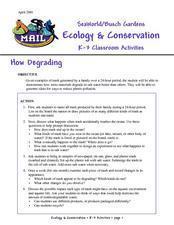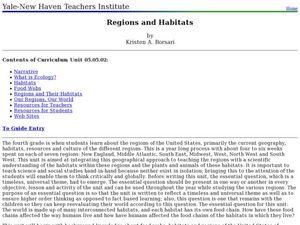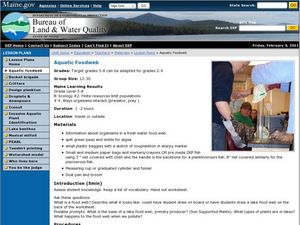SeaWorld
Ecology & Conservation
How much trash does an average family produce in 24 hours? Where does that trash end up? Get your youngsters thinking about ecology and conservation as they discuss the impact pollution has on the marine environment. After a deep...
Curated OER
Forest Food Chains and Webs
Students explore forest ecological systems. In this ecology lesson, students classify forest plants and animals according to their ecological roles. Students play a related vocabulary guessing game. Students choose a card on which...
Curated OER
Principles of Ecology
In this ecology worksheet, students will review 10 vocabulary words associated with the basic principles of ecology. This worksheet has 10 fill in the blank questions.
Curated OER
Food Chain/Food Web
Students explore ecosystems. In this ecology lesson, students read an article explaining ecosystems. Students create a visual organizer with index cards using components of various ecosystems.
Curated OER
Ecology - Food Chains
Young scholars discuss the concept of a food chain in the California ecosystem. in this food chain lesson, students look at different cards and sort them into herbivores, carnivores, decomposers, and omnivores. Then they use these cards...
Curated OER
Texas Ecoregions Summary Sheet
In this ecoregions of Texas worksheet, students complete a summary of a particular ecoregion in Texas. They find the producers and consumers of the region, they draw a food chain, the draw a food web, and they complete an energy pyramid...
Curated OER
Ecology: The Food Web
In this ecology instructional activity, students match the vocabulary to the definitions, then represent producers and consumers by drawing a Pyramid of Numbers.
Curated OER
Food Chains, Food Webs, Biomass Pyramids and Cycle
In this food chains worksheet, students complete a crossword puzzle by placing 16 terms into the puzzle that match the clues given. Students review food webs, biomass pyramids, and the water cycle.
Captain Planet Foundation
Energy Flow in the Garden
How can you tell what an owl has eaten? Study the food chain and flow of energy in an ecosystem by dissecting an owl pellet and noting the bones found inside. Additionally, the lesson includes a game about consumers and producers with a...
Intel
Insects: The Good, The Bad, The Ugly
What would the world be like with no insects? Ponder this question using a research-based STEM unit that encourages scholars to investigate insects from both a beneficial and hazardous perspective. They learn about insect behaviors,...
Curated OER
Wetlands - Food Web Relationships
In this food web relationships activity, students click on the links to learn about the food web relationships in the wetlands and answer short answer questions about it. Students complete 8 questions total.
Curated OER
Forest Food Web Activity
Pupils gain knowledge of food webs and ecological interconnections in the forest, and place different life forms in their proper place in a food chain. Students appreciate the balance of nature and how humans are affected by extinct...
August House
Go to Sleep, Gecko
Use this multidisciplinary lesson to delve into these subjects: English language arts, math, science, drama, and character education. After reading, discussing, and making interpretations about Go To Sleep, Gecko!: A Balinese...
Curated OER
Forest Food Webs
Young scholars consider the interdependency of life in a temperate forest by studying selected organisms from an Asian temperate forest and creating a food web.
Forest Foundation
The Web of Life
Producers, herbivores, carnivores, omnivores, decomposers. To begin a study of the forest ecosystem, learners examine the connections among the members of ecological communities.
Curated OER
Explore the Food Web
Students identify plants and animals in the journals of Lewis and Clark's expedition. They describe the various animal habits. Students interpret the behaviors of the animals discovered on the expedition. They design a food web using...
Curated OER
Making a Food Web and Learning About Ecosystems
Third graders examine the difference between a food web and food chain. They also examine the importance of the sun in a food web and food chain. Students understand what happens when you remove parts of the chain.
Curated OER
Pond Ecology
A lab activity is a great way to incite thoughtful questioning and scientific processes. Pupils will collect organisms with a Petri dish, make observations, sketch the organism, ask questions, then attempt to identify the specimen...
Howard Hughes Medical Institute
Modeling Trophic Cascades
In the ecological game of who eats who, one small change can have a big impact! Individuals create food chains in an array of ecosystems, then determine what happens to organisms in the chain when one organism changes its feeding...
Curated OER
Regions and Habitats
Fourth graders identify the different habitats found in the seven regions of the United States. In this ecology lesson plan, 4th graders write an essay about how humans affect the ecosystem and vice versa. They discuss how changes on one...
Curated OER
Polar Food Web Comparison
Seventh graders practice the evaluation component of the scientific method while comparing and contrasting the similarities and differences of the food chains and webs of polar animal life. They study about classification and ecology...
Curated OER
Nutrition and Energy Flow
In this energy flow worksheet, students will complete 10 short answer questions based on a food web diagram. Then students will review different cycles in nature including the water cycle, carbon cycle, and energy cycle. This worksheet...
Curated OER
Aquatic Foodweb
Students explore what a food web is. For this science lesson, students examine how nutrients and other pollutants enter a lake and play a food web game whereby students pretend they are either zooplankton, planktivore,...
Curated OER
Rainforest Food Chain
Students investigate a rainforest food chain. In this ecology lesson, students are shown pictures of plants and list what animals might eat the plants. Students continue to think of what other animals might eat those animals. Students...

























